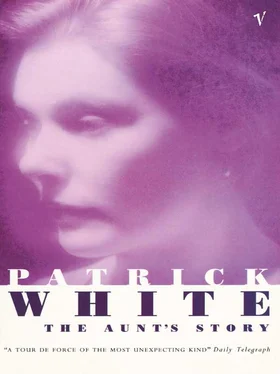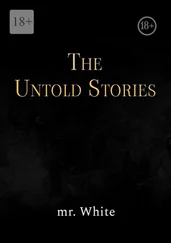With love from
Lou
‘If you would like to go, Theodora,’ Mrs Goodman said, ‘there is no reason why you should not. I have the utmost faith in Dr Gilsom, and I can always call in Connie Ewart if anything should happen.’
So the relationship between Lou Parrott and Theodora Goodman remained both close and distant. Paper, from long holding, becomes warm in the hand. This way Theodora was warmed. She carried the letter from Lou, she carried it even in the street, secretly, in her glove.
In the streets in which Theodora walked at dusk the sky was restless. Its fever fluctuated. The violet welts and crimson wounds showed. The trams gushed sparks. All along the streets the hour was fusing even the fragments of unrelated lives, almost of Theodora Goodman. The faces clotting at corners were not so very obscure in this light. The veins were throbbing with the same purple. It was about this time that Theodora noticed the big white flower, glittering and quivering with pollen, grow slowly from the pavement, sway and bend, offering its thick arum skin.
Theodora felt the warm gusts of the white woman. She felt her eyes. She saw the wet lips that many nights had pulped. Such a glittering progress, that was both lovely and obscene, turned her own skin to bark under her brown clothes.
How did you feel
When you captured your ideel?
the woman sang.
Her teeth were gold, and her voice as thick as blotting paper, that you began to read, the yellow writing in reverse. Theodora held the woman’s voice before the mirror, and the glass was hung with golden plaits, heavy as harvest on the dining-room carpet. Out of the past Pearl fell.
‘Pearl!’ said Theodora. ‘It is surely Pearl!’
‘Pearl?’ said the white woman, as if doubting an echo.
She held her head on one side against the screaming of the trams.
‘Yes,’ said Theodora, ‘yes. Pearl.’
She came closer to touch the woman’s hand, to confirm that what was fat and white had once been cold and red, from washing in the yard.
‘But of course,’ said Theodora, ‘even I am forty-five.’
‘If a day,’ said the woman coldly.
Because now she suspected a plant, some new game the johns were trying on. Her face hardened to resist.
‘But you have lasted, Pearl,’ said Theodora. ‘How beautiful you are still.’
‘I’m no bloody corpse,’ the woman said. ‘So they tell me anyways. But who are you, with your Pearl, Pearl?’
Now it was not so much a plant that her voice feared, as somebody trying to open a cupboard of which she had thrown away the key.
‘Come on,’ she urged, her white forehead cracking in a black frown. ‘I ain’t got all night. I got an appointment with a friend.’
Then her face began to open up. It was as clear as morning. Pearl Brawne stood trembling in the yard.
‘Christ, strike a bloody light! Let us see,’ said Pearl. ‘It makes you feel sick. It makes you feel queer. Theo Goodman, eh?’ she said. ‘How about a drop to buck us up? Just one before they close.’
Theodora Goodman went with Pearl Brawne into the public house. It was no longer odd. She followed Pearl beyond the rasping of the frosted glass.
Pearl said two ports. She said it would warm the cockles.
Though the air was already suffocation hot. It swirled grey. At the bar a man with a mulberry nose had a talent for eating glass. He was munching slowly at his tumbler. It did not seem odd, though somebody screamed.
‘Makes you think they was loopy,’ Pearl said.
Theodora did not see why.
Because object or motive had achieved a lovely, a logical simplicity. She had found Pearl. She touched the stem of her frail glass. Things were as plain as the notes of a five-finger exercise played in the frost.
‘Well, Theo, tell,’ said Pearl, arranging her big white hands in front of her bust.
‘There is nothing to tell,’ said Theodora.
‘Go on, Theo,’ Pearl said, ‘there is always everything to tell.’
‘I am forty-five,’ said Theodora, ‘and very little has happened.’
‘Keep that under your lid, love. It is something to forget,’ said Pearl, knitting her hands.
‘I am an aunt,’ said Theodora. ‘I suppose there is at least that.’
‘I could have guessed it,’ said Pearl.
‘Why?’
‘Now you are asking,’ Pearl said.
She laughed. It was not unpleasant. She was kinder than kindness. Theodora’s body bloomed under the kind rain of Pearl. She touched her small purple glass. She loved the glasseater’s purple nose.
‘Two ports,’ Pearl said. ‘No? Well, I shall have another. For me health, dear. Does you good.’
Theodora wondered how the purple world of Pearl, that was so close, eludes other hands. Life is full of alternatives, but no choice.
‘When I went from yous,’ said Pearl, ‘I had a little boy. He died.’
‘That was sad, Pearl,’ Theodora said.
‘No,’ said Pearl, ‘it was not sad.’
She blew a big white funnel of smoke, and it was logical, but not sad.
‘It just happened that way,’ said Pearl.
‘And Tom Wilcocks?’
‘Why Tom?’
‘I wondered.’
‘Phhh, I never cared for Tom!’
Her breath emphasized.
‘I had everything I wanted,’ Pearl said. ‘I had friends. I had silk gowns and gorgeous lingerie. Nobody hates Pearl. Hey, Dot, give us another port. For the sake of old times.’
Now the port flowed in a powerful purple stream.
‘When I was a kid,’ said Pearl, ‘I used to want an alarm clock. I was scared these was somethink I might miss.’
‘Yes,’ cried Theodora, ‘I know, I know.’
‘You!’ said Pearl. ‘What do you know? Garn, you !’
Her mouth tipped. Pearl had descended deeper than the port could reach. Theodora did not suggest that she had perhaps plumbed the same depths. She did not feel capable.
Instead she said in the voice that people were accustomed to accept as hers, ‘You are right, of course. I know very little. Still.’
‘You poor kid,’ cried Pearl in her big white blotting-paper voice that craved for moisture. ‘I had a friend who could say off bits of the cyclopaedia. You couldn’t ask a question without he knew the answer. You couldn’t carry on a conversation. Made me nervous in the end. My bloody word! As bad as your Dad, Cyril was. Remember your Dad, Theo, eh?’
But Theodora would have blocked her ears with wax. She could not bear to face the islands from which Pearl sang. Now her veins ebbed, which had flowed before. Almost overhead hung an almost stationary electric bulb. Pearl saw this too. She huddled. Her white face was streaky grey.
‘Sometimes it winks,’ Pearl said. ‘Sometimes it just looks.’
‘Then it is time,’ said Theodora. ‘I must leave you.’
‘What did you expect’ said Pearl. ‘I got an appointment with a friend. A commercial gentleman from Adelaide.’
Outside the night had ripened. It was big and black. Pearl began to look all ways. Pearl was lost.
But Theodora had the strength of childhood.
‘Good-bye, Pearl,’ she said, and she kissed the big white face from which the wind was blowing the powder. ‘Good-bye, Pearl.’
As poignantly and relentlessly as if the cart were waiting in the back yard.
‘So long, dear,’ said Pearl.
She began to sway away, glass now, her large flower, but cut glass. She could have broken. Her big white powdered scones moved, but only just, on their stately cut-glass stand.
‘Don’t tell me I’m shickered,’ she said. ‘Now where’d that bugger say he’d be?’
Then the night gulped, and she was gone.
Theodora Goodman did not tell her mother that she had seen Pearl Brawne, because it was far too secret.
Читать дальше












